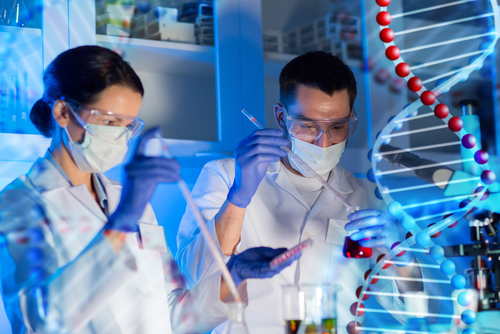Interim Results of Alta Study Support SB-525’s Potential as Severe Hemophilia A Treatment

Investigational gene therapy SB-525 can safely induce durable clotting factor VIII (FVIII) activity in patients with severe hemophilia A, preliminary data from the Phase 1/2 Alta clinical trial show.
The trial’s most recent results were discussed at the International Society on Thrombosis and Haemostasis (ISTH) 2019 Congress in Melbourne, Australia. The oral presentation was titled “Initial results of the Alta study, a phase 1/2, open label, adaptive, dose-ranging study to assess the safety and tolerability of SB-525 gene therapy in adult subjects with hemophilia A.”
SB-525 is a gene therapy candidate being developed by Sangamo Therapeutics and Pfizer. It consists of a small portion of genetic material that encodes and promotes the production of functional FVIII by liver cells.
The goal of the therapy is to regain the ability to continuously produce the coagulation factor, which then can be released from liver cells into the bloodstream. That will help reduce or eliminate the need for factor VIII replacement therapy.
The safety and effectiveness of increasing doses of SB-525 is currently being explored in the open-label Alta study (NCT03061201) in patients with severe hemophilia A.
To date, 10 adult men (mean age 30.7 years) have received one of four ascending doses of the therapy, ranging between 9e11 vg/kg and 3e13 vg/kg (four patients in this group).
Across all dose groups, patients showed progressive increases in FVIII levels. The first two patients who received the highest tested dose (3e13 vg/kg) achieved steady FVIII activity values within normal range approximately five weeks after receiving the therapy.
These patients also showed a significant reduction in the use of FVIII replacement therapy, and had no spontaneous bleedings for at least 24 and 18 weeks after treatment.
This group had two more patients, one with a follow-up of five weeks at the time of data cut, that also had no spontaneous bleedings, and the other with less than three weeks of follow-up (no data available). The company stated that the FVIII activity data for these two patients appears consistent with the first two patients in this group.
“The initial results with SB-525 gene therapy for patients with severe hemophilia A continue to look very promising,” Barbara Konkle, MD, said in a press release. Konkle is with Bloodworks Northwest in Seattle, a professor of medicine at University of Washington, and a principal investigator of the Alta study. “It will be important to continue to follow these patients to understand the potential long-term durability of this gene therapy.”
Interim safety data has shown that SB-525 is generally well-tolerated, with only one treatment-related serious adverse event (side effect) being reported.
One participant experienced hypotension (low blood pressure) and fever six hours after completion of SB-525 infusion. His symptoms were fully resolved with adequate treatment and the patient was discharged as planned within 24 hours.
Most common adverse events, which were mild to moderate in severity, were liver enzyme elevation, fever, hypotension, fatigue, muscle pain, and tachycardia (abnormally fast heart rate).
“The initial results of the Alta study presented at ISTH demonstrate that SB-525 has the potential to be a predictable and reliable treatment that may bring clinical benefit to patients with hemophilia A,” said Adrian Woolfson, MD, PhD, executive vice president of research and development at Sangamo. “We look forward to continuing to follow these patients to further understand the durability of response to SB-525 gene therapy and to working with Pfizer to potentially advance a registrational study.”
Sangamo and Pfizer expect a fifth patient to receive 3e13 vg/kg dose of SB-525 soon to further explore the potential of this gene therapy.
Based on these positive preliminary results, the U.S. Food and Drug Administration granted regenerative medicine advanced therapy (RMAT) designation to SB-525 for the treatment of severe hemophilia A.
This adds to the previously awarded FDA’s orphan drug and fast track status, and orphan medicinal product designation from the European Medicines Agency, which are expected to expedite and support SB-525’s clinical development and marketing approval.
“We are encouraged by the initial clinical data suggesting safety, tolerability, and efficacy of SB-525. We are also encouraged by our interactions with regulators and by the FDA’s recent RMAT designation,” said Seng Cheng, senior vice president and chief scientific officer of Pfizer’s rare diseases research unit. “If FVIII levels are sustained, and patients continue to have no bleeding episodes and remain off factor replacement therapy, we believe that this gene therapy may potentially represent a transformative treatment paradigm for severe hemophilia A.”






